#business industrial
Text
*raises my hand to ask a question* what if we collectively refused to refer to AI as 'AI'? it's not artificial intelligence, artificial intelligence doesn't currently exist, it's just algorithms that use stolen input to reinforce prejudice. what if we protested by using a more accurate name? just spitballing here but what about Automated Biased Output (ABO for short)
31K notes
·
View notes
Text
Making the corpse dance
Ten years ago, Dong Nguyen killed a chart-topping game. After realizing it had become "an addiction" for players, his guilt became so bad that he couldn't sleep.
Today, Gametech Holdings, LLC has revived this game but with *more* dark patterns, loot boxes, and predatory design.
This is cool.
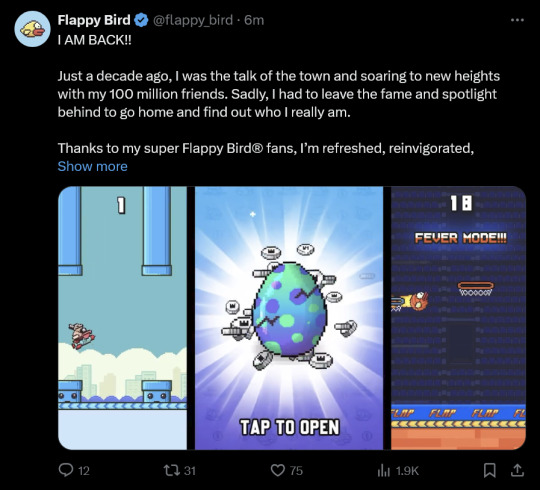
"But why would Nguyen sell the Flappy Bird Trademark??" "Hope he got his bag!"

Looks like he *didn't*. It seems like it's been long enough that the trademark was considered abandoned, so Gametech Holdings LLC filed against him, and just. Grabbed it for free.

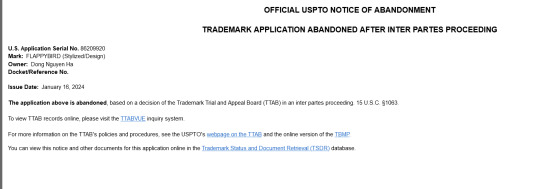
You can see all the court docs here: https://ttabvue.uspto.gov/ttabvue/v?pnam
The funniest (and saddest) part is... we're so much worse than Flappy Bird now. It seems *tame* by comparison.
In a better world, the story would have ended with this tweet.

#At LEAST the guy who created the game Flappy Bird was (allegedly (VERY heavily)) based on is part of this. So that's something.#flappy bird#gamedev#the game industry is awesome#i lvoe big business
3K notes
·
View notes
Text
Federal regulators on Tuesday [April 23, 2024] enacted a nationwide ban on new noncompete agreements, which keep millions of Americans — from minimum-wage earners to CEOs — from switching jobs within their industries.
The Federal Trade Commission on Tuesday afternoon voted 3-to-2 to approve the new rule, which will ban noncompetes for all workers when the regulations take effect in 120 days [So, the ban starts in early September, 2024!]. For senior executives, existing noncompetes can remain in force. For all other employees, existing noncompetes are not enforceable.
[That's right: if you're currently under a noncompete agreement, it's completely invalid as of September 2024! You're free!!]
The antitrust and consumer protection agency heard from thousands of people who said they had been harmed by noncompetes, illustrating how the agreements are "robbing people of their economic liberty," FTC Chair Lina Khan said.
The FTC commissioners voted along party lines, with its two Republicans arguing the agency lacked the jurisdiction to enact the rule and that such moves should be made in Congress...
Why it matters
The new rule could impact tens of millions of workers, said Heidi Shierholz, a labor economist and president of the Economic Policy Institute, a left-leaning think tank.
"For nonunion workers, the only leverage they have is their ability to quit their job," Shierholz told CBS MoneyWatch. "Noncompetes don't just stop you from taking a job — they stop you from starting your own business."
Since proposing the new rule, the FTC has received more than 26,000 public comments on the regulations. The final rule adopted "would generally prevent most employers from using noncompete clauses," the FTC said in a statement.
The agency's action comes more than two years after President Biden directed the agency to "curtail the unfair use" of noncompetes, under which employees effectively sign away future work opportunities in their industry as a condition of keeping their current job. The president's executive order urged the FTC to target such labor restrictions and others that improperly constrain employees from seeking work.
"The freedom to change jobs is core to economic liberty and to a competitive, thriving economy," Khan said in a statement making the case for axing noncompetes. "Noncompetes block workers from freely switching jobs, depriving them of higher wages and better working conditions, and depriving businesses of a talent pool that they need to build and expand."
Real-life consequences
In laying out its rationale for banishing noncompetes from the labor landscape, the FTC offered real-life examples of how the agreements can hurt workers.
In one case, a single father earned about $11 an hour as a security guard for a Florida firm, but resigned a few weeks after taking the job when his child care fell through. Months later, he took a job as a security guard at a bank, making nearly $15 an hour. But the bank terminated his employment after receiving a letter from the man's prior employer stating he had signed a two-year noncompete.
In another example, a factory manager at a textile company saw his paycheck dry up after the 2008 financial crisis. A rival textile company offered him a better job and a big raise, but his noncompete blocked him from taking it, according to the FTC. A subsequent legal battle took three years, wiping out his savings.
-via CBS Moneywatch, April 24, 2024
--
Note:
A lot of people think that noncompete agreements are only a white-collar issue, but they absolutely affect blue-collar workers too, as you can see from the security guard anecdote.
In fact, one in six food and service workers are bound by noncompete agreements. That's right - one in six food workers can't leave Burger King to work for Wendy's [hypothetical example], in the name of "trade secrets." (x, x, x)
Noncompete agreements also restrict workers in industries from tech and video games to neighborhood yoga studios. "The White House estimates that tens of millions of workers are subject to noncompete agreements, even in states like California where they're banned." (x, x, x)
The FTC estimates that the ban will lead to "the creation of 8,500 new businesses annually, an average annual pay increase of $524 for workers, lower health care costs, and as many as 29,000 more patents each year for the next decade." (x)
Clearer explanation of noncompete agreements below the cut.
Noncompete agreements can restrict workers from leaving for a better job or starting their own business.
Noncompetes often effectively coerce workers into staying in jobs they want to leave, and even force them to leave a profession or relocate.
Noncompetes can prevent workers from accepting higher-paying jobs, and even curtail the pay of workers not subject to them directly.
Of the more than 26,000 comments received by the FTC, more than 25,000 supported banning noncompetes.
#seriously cannot emphasize enough that this is going to be a huge deal for so so many people#it could seriously drag up wages in food and service industries in particular#especially in the long run#and also massively reshape tech and video game industries#do you have any idea how many game devs are legally not allowed to start their own studios? probably most of them#and that's about to change for the better!!#ftc#noncompete#united states#us politics#business#business news#biden administration#voting matters#democrats#federal trade commission#video game industry#game devs#fast food#fast food workers#labor#labor rights#workers rights#blue collar#service workers#good news#hope
3K notes
·
View notes
Text

long hair korra doodle
738 notes
·
View notes
Text
Irondad fic ideas #130
You know that trope where SI employees call Peter "Stark Jr."?
Fic where Tony learns about this and loves it. One night, at one of their weekly Ironfam dinners, he gleefully brags about it in front of May
In retaliation, May says to Tony, "Okay, Parker Sr."
No angst miscommunications, just hilarity. Everyone knows this is about the honor of being included in each other's families
#irondad fic ideas#irondad and spiderson#ironfam#now when tony is acting extra fatherly rhodey happy and pepper all call him mr. parker#when peter is being confident or dramatic they all call him mr. stark#peter as he gets home: if i have to study for one more minute i will DIE. i will HURL MYSELF INTO THE SUN.#may: what happened?#happy: mr. stark is not enjoying his mandatory sat prep time#when tony leaves a meeting in a rush because midtown called:#pepper accidentally on instinct: sorry mr. parker had urgent business to attend to#tony stark#peter parker#may parker#if this leads to conspiracy theories of truly epic proportions what of it?#iron dad and spider son#irondad#iron dad#spiderson#spider son#stark industries#queueueueue#weekly reminder that i love you all but am too busy to be human :)#fic ideas still postponed but you can send asks if you want i just won't see them for a while#see announcements
2K notes
·
View notes
Text
“ not a girl’s girl” but having almost exclusively female openers since 2018 and consistently supporting their work
#sharing one of the biggest stages with smaller artists and promoting their work#I think there was maybe 2 male openers#there’s no other woman in the industry giving opportunity to young & upcoming artists like Taylor does#17 different openers and only 2 were men#all bc she doesn’t give participation trophies in what is business#also wears a lot of stuff from women owned small businesses#and literally providing her home as a safe place for some going though a custody battle
213 notes
·
View notes
Text
to preface this post i am anti-advertising i think we should explode the entire industry but it's sooo funny when you people make posts like "and they don't even work!!" like. sorry to be the bearer of bad news but yes they do. that's why we have to put up with so many despite everyone hating them and thinking its annoying. because they actually work really well and make a shit load of money
#it actually would be way better if they didnt work and made no money bc businesses would abandon them#this isnt like stocks where everythings abstract and is essentially gambling (i dont understand stocks)#like ppl in the ad industry create things. that make a tangible and quantifiable impact on the business#which is then used in further ad planning. it is NOT all smoke and mirrors#like its fake in that the industry is not providing a necessary service the way like. grocery stores are#but its not the level of fake where everything is abstract like theres deliverables#moreover there is an extensive body of academic work specifically on how to make ads more effective#ALSO i think some of u views ads like. as if they have a win condition. which is you buy product#but in current advertising this is pretty rare and comparatively ineffective#which is why you see MANY ads which dont seem to be selling anything in particular. or which have nothing all to do with the product#the 'win' condition for THAT kind of ad is something more like 'viewers remember our name'#like. ex i would say ads for temu have not been effective on me bc i havent bought anything from them#but temu probably thinks they were SUPER effective on me because i talked abt them like 5 different times at work#and i do in fact know exactly what the company does and what they sell#and they were able to capitalize on the reputations of existing companies (wish shein etc) to build their own brand#good idea generator
718 notes
·
View notes
Note
Could you please explain what that actually means when Simon said he doesn't own One Direction name?
I’m not a specialist, and we haven’t discussed contracts and business within the music industry for a while, so I apologize if I’m missing some facts. But basically, control over the band's name can have a massive impact on decision-making and financial outcomes. If he owned the name One Direction, that would give him full control over the brand, merch, and sort all commercial uses. The fucker regrets not owning it because he 👏 wants 👏 to 👏 profit 👏 more 👏. It’s all about money. He could be licensing products (he even mentions animations in the video), he could also organize a potential reunion and do whatever he wanted with the band, who knows…
There are so many layers to this. He also mentioned that a band member dropping out of half the tour wouldn’t be a problem if he owned the band because band ownership includes controlling decisions like continuing a tour despite these kinds of changes. I haven’t watched the full interview, but it seems to me he implies that One Direction wouldn’t be on indefinite hiatus if it were up to him. He could even have potentially reformed the band with new members or taken other directions to keep it going without even needing the consent of OT5. I mean, that’s how messed up things could have been. He regrets that the artists are the ones still in control and profiting from it!!!! He wanted to own it so the actual band members would be just puppets, not really an important part of it. No human decency, just money and business. And people still don’t believe all the awful things that went down behind the scenes. We don’t know half of what these fucking greedy people put the boys through.
Side note: He also implies multiple times that Syco did fully own the band at some point. Which is confusing, because we obviously know how controlling the label was for them and how much they profited from One Direction, but I’m pretty sure the boys always owned at least part of the band, they created a company at the very beginning and they obviously still own it and earn from the band to this day. So I’d love to know what the deal actually was and what point this changed.
In reference to this
184 notes
·
View notes
Note
former youtube ceo susan wojcicki just died of lung cancer

"Her loss is devastating for all of us who know and love her, for the thousands of Googlers she led over the years, and for millions of people all over the world who looked up to her, benefited from her advocacy and leadership, and felt the impact of the incredible things she created at Google, YouTube, and beyond," Google and Alphabet CEO Sundar Pichai said in a note to employees.
source 1
source 2
source 3
#destiel meme news#destiel meme#news#united states#us news#world news#tw death#susan wojcicki#youtube#google#technology#tech industry#alphabet inc#business#business executive#ask
92 notes
·
View notes
Text
If Movie! Morro isn't obsessed with being the green ninja and is a functioning member of society that wants nothing to do with the Ninja, what would his grown-up adult job be?
#i'm thinking ceo of a super competitive company#where he's the best of the best in the industry at whatever he does#Windmill business ??#ninjago#morro wu#the lego ninjago movie#lego ninjago#tlnm#morro ninjago#ninjago morro#zebaji-posts
63 notes
·
View notes
Text
It's not just the Black Keys. Why are so many big tours selling poorly?
Stereogum | June 11, 2024 | by Zach Schonfeld
long (and US focused) but still quite interesting article on the current state of concert touring, why tours are getting cancelled or downsized, and what's up with ticket pricing. (my selected excerpts/highlights under the cut)
[excerpt, all highlights mine]
[Eric Renner Brown, a senior editor at Billboard] adds, “I do think [The Black Keys] are an artist that can fill those rooms still. I think the demand is there in terms of people who want to see Black Keys. But perhaps at that price point, the demand was not there.”
Ostensibly, agents and promoters should have access to data that can give them a better sense of demand. But they often place outsized importance on raw streaming numbers.
“The data is very confusing,” says the anonymous booking agent. “There’s a lot of passive listeners for data. You can have millions upon millions of streams, but that doesn’t mean it’s gonna turn into tickets. The opposite is, there are some artists who don’t have many streams at all and they can sell like 2,000, 3,000 tickets.”
[..]
It’s worth noting that the Black Keys have released four albums since returning from hiatus in 2019, and toured arenas as recently as 2022. This may be a case of oversaturating the market.
The band’s 2019 and 2022 arena runs weren’t exactly sold out. In between, the band left their longtime manager in 2021, signing with Irving Azoff and Steve Moir at Full Stop Management. Some sources speculate that Azoff, a former CEO of Ticketmaster, may have encouraged ambitious touring plans. On Thursday, Billboard reported that the group has now parted ways with Azoff and Moir. (The management company did not respond to a request for comment.)
“Essentially, you have some very big managers that are out of touch with the granular finesse and nuance of ticketing,” says another anonymous booking agent. “And they have these large expectations and they tell their agents what they want. And the agents are probably texting each other on the side, going, ‘This man is out of his fucking mind.’ But they do it anyway because, in the case of Black Keys, they’re not gonna challenge Irving Azoff.”
[..]
One contributing factor to instability in the touring industry is the rising cost of… well, everything. It’s part of why ticket prices are so high; it’s also part of the reason some acts are backing out of touring commitments.
Bands at all levels have been sounding the alarm about this for years. In 2022, for instance, Animal Collective canceled European tour dates and explained, “We simply could not make a budget for this tour that did not lose money even if everything went as well as it could.”
Industry insiders say that’s not uncommon. “Everything is ridiculously expensive,” says a tour manager who works with major acts and asked not to be named. “There’s not enough gear for everyone to share, so the vendors are having to pay high amounts for equipment. A single bus for a six-week tour can cost $100,000. Multiple that by multiple buses, and then trucks, and then crews are at a minimum, so they’re getting top rate right now because there’s not enough crews.”
COVID, of course, exacerbated this crunch. “What happened after the pandemic is, everyone was ready to tour at once,” the tour manager says. “There’s not enough gear to cover all of that. A lot of bands have had to cancel tours because they don’t have gear or they couldn’t afford the gear,” the tour manager continued. “I was on a tour with somebody last year where we had to book a private jet because there were no buses available. For the first week of the tour, we had to charter planes.”
Acts are thus incentivized to book bigger venues to recoup the costs of touring. The catch-22 is that bigger venues necessitate more elaborate stage production, which makes for a more expensive tour.
“There’s the expectation to have that production,” says the tour manager. “If people went back to having just two trusses of lights and a P.A. and no frills, it was just about the music, they can afford to tour. But everyone wants to see those flashing lights. Everyone wants to see that video.”
“So much of the economics of these big tours is completely invisible to fans and consumers,” says Kevin Erickson, director of Future of Music Coalition, a nonprofit advocacy group. “You can sell out a tour and come back in the red if there was a cost overrun or a miscalculation.”
For mid-level acts with sizable followings, these frustrations are compounded by a lack of suitable mid-sized venues.
“For a band that maybe has assessed its demand in the market to be in the 8K range or something for capacity, where are they going to go if that sort of venue doesn’t exist?” says Brown. “And if, say, the local theater that seats 3K or 4K can’t accommodate two or three nights, it can only put them for one night on the tour routing. That’s a real concern.”
[..]
At the end of the day, it all comes back to price. The average ticket price for one of the top 100 tours rose from $91.86 to $122.84 between 2019 and 2023. Concerts are too damn expensive, and there’s a growing sense of consumer frustration with shows that cost as much as airline tickets.
-> read the full article here on Stereogum.com
#recommended reading!#this should answer a lot of questions for everyone who were up in arms after the asian tour cancellation last year...#about the current touring climate and costs#streaming numbers ≠ ticket sales#..should not be that big a surprise for industry people and yet..#also that azoff anecdote.. who's surprised lol#touring#music industry#live music#article#stereogum#11.06.24#the black keys#music business#link#m
54 notes
·
View notes
Note
a lot of people are probably asking you this, but if they aren't... do you have any clue what's going on with bioware? first moving swtor to another studio, which seems like it can be both a good or a bad thing, and now they're laying off 50 more people? studio veterans included?
this just seems like a very weird move to me, if not outright shitty. i want to believe in bioware, i love their games, no matter how flawed they are, but in the three years i've been familiar with them, things seem to be getting worse and worse. i know that DAD is in alpha so probably this layoff won't affect its quality too much, but again, that looks like a terrible move towards the employees themselves and the studio's more distant future.
Bioware is basically following the publisher mandate. In March of this year, EA declared that they were going to cut roughly 6% of their workforce (~800 layoffs) to lower costs, likely because they (like many tech companies) over-hired during the pandemic and need to correct the burn rate to appease their shareholders. These 50 devs being cut are Bioware's unfortunate sacrifice to the layoff declaration. As to whom and why, I suspect it is a combination of things.

Bioware probably had some kind of incubation team working on a secret new project that wasn't a sequel to an existing current franchise. I know that they would often have one or two such teams going at any given time - Anthem was one such project, as was the short-lived Shadow Realms project. New projects like that are much riskier than franchise sequels, so it is likely that the publisher decided that the risk moving forward was too high and they cancelled the experimental projects in favor of focusing on their established brands (Mass Effect and Dragon Age).
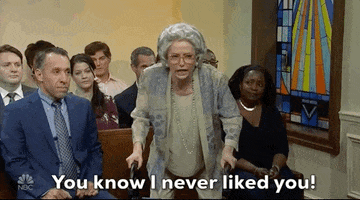
It is also likely that some of the long-term veterans are quite expensive to keep - they have high salaries and have been around long enough to collect on many of the big benefits EA offers, like sabbatical leave and the like. There's also the real possibility that there could be some bad blood or major creative differences between the current studio leadership and some of those veterans that were let go.
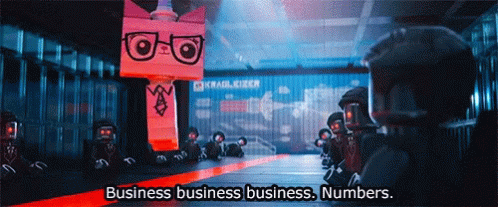
My heart goes out to those affected and I really do hope they land on their feet. The unfortunate truth of the matter is that employers never deserve any more loyalty than they're willing to give their employees. The employer will never choose an employee over its own survival, so we as workers should expect to do the same for ourselves. I never consider long tenure at an employer to be worth much when it comes to the business decisions, because I know how little it is worth when all is said and done. Business gonna business.
[Join us on Discord] and/or [Support us on Patreon]
Got a burning question you want answered?
Short questions: Ask a Game Dev on Twitter
Long questions: Ask a Game Dev on Tumblr
Frequent Questions: The FAQ
260 notes
·
View notes
Text
I really want to watch Dead Boy Detectives, it looks very good and like everything I would love in a paranormal tv show, but have been burned before, by many networks but specifically by Netflix. I will not watch any new fantasy shows by them until we have guaranteed at least 3 seasons or we already have them out. My heart cannot be broken like this again, like it did with Lockwood & Co and Shadow and Bone.
(I'm currently watching House of the Dragon and making my way through the Ghibli catalogue instead.)
#dead boy detectives#netflix#fuck netflix#I hate their business model so much#shadow and bone netflix#shadow and bone#lockwood and co#fantasy tv shows#paranormal#rambling#idk what is this post#just wanted to out my thoughts on my disapointment on the tv industry lately i guess#ramblings#tv shows#tv industry#I don't want my mind changed#sorry#I will not be watching it for now#I'm just voicing some thoughts#thats it#don't need convining#but I'm happy for the fandom
43 notes
·
View notes
Text
Tony is not a businessman
Crazy opinion, some might say. But I know what I'm talking about. Let me show you.
Here's a hypothesis: Tony was never interested in becoming CEO of SI or any other company. Never wanted to do business for life. Was not interested in what's going on in his company before Afghanistan. And never even learned how to run it.
Let's check the facts we have:
Before becoming CEO, Tony spent his entire life as a student. He had degrees in science and engineering. Nothing close to business. No MBA, no economics, no management. His interest was focused on robotics and AI. Before his parents died, he had no experience running a company or working in business. I'm sure his father gave him some business training. Including, of course, how to behave in public so as not to be eaten by sharks. But that's it. He never showed or mentioned any interest in business.
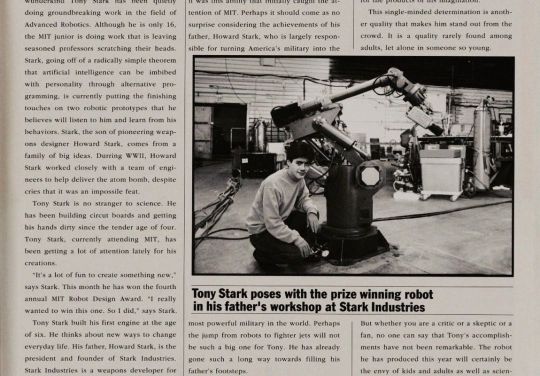
He was not interested in expanding his company or making more money. He stopped at $10-20 billion. Never earned more, but could. Reminder from this post about the net worth of real billionaires: Elon Musk - $210 billions, Jeff Bezos - $195 billions, Bill Gates - $129 billions. Huge difference. And they are not even as brilliant as he is.
He also didn't try to buy and take over other companies.
He didn't really care about money. He stopped weapon manufacturing after returning from Afghanistan. He knew that SI could go bankrupt. Easily. But he did it anyway. He could have made a lot of enemies. Including politicians and military. He did it anyway.

He instructed Pepper not to do business with other companies working on anything that could be used as a weapon.

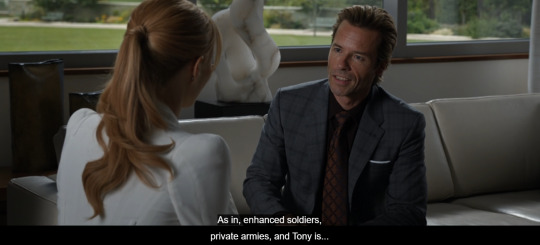
And this means fewer projects and contracts, less profit and influence on the market and many industries.
Have you ever seen him actually run SI independently? In IM1, he showed Jericho to officers in Afghanistan and reported back to Stane on how it went.
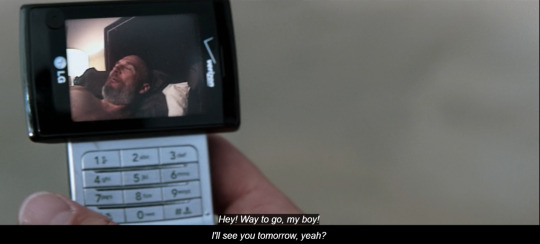
He wasn't even aware of the Board meeting.
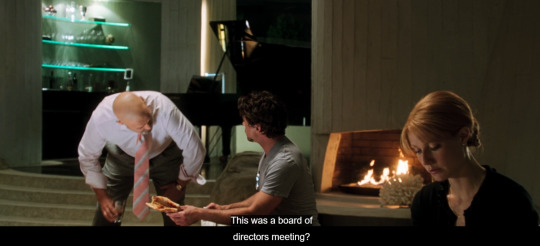
He appointed Pepper as CEO. Yes, he thought he was going to die soon. But he never took it back. This gave him more freedom to do what he was most interested in and enjoyed doing - science and saving the world.
When he was appointing her in IM2, he said:
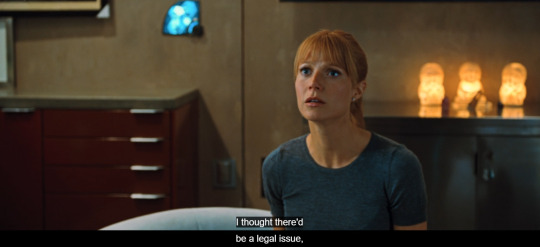
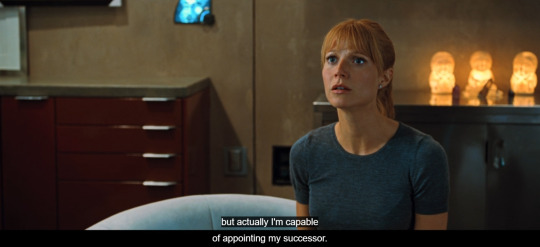
He thought. He didn't even know how the company's processes worked. Because he was not interested, and because Stane was doing business for him.
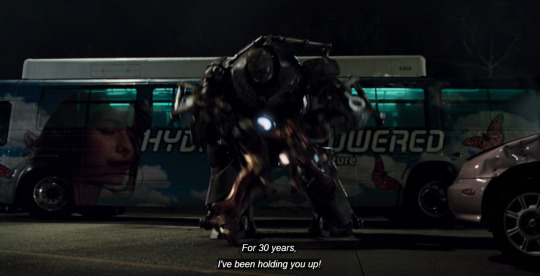
And Tony simply trusted him and the board of directors because they promised him they wouldn't do dirty business. That was the only thing that interested him back then.
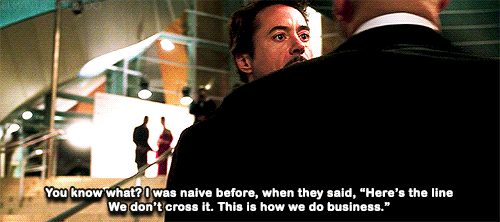
That's why he had zero awareness of all the under-the-table deals Stane made behind his back. Because Tony never looked back. He trusted them. This trait will again hurt him greatly in the future.
We never saw him in his office (only when it became Pepper's office). He was always at home in his lab.
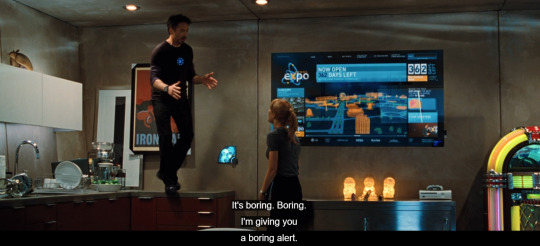
Every time Pepper or other people came to Tony with business matters, Tony tried to get rid of them (the matters and the people). To postpone, to ignore, to be late, intentionally or not. It was boring. He didn't like the people in business. He didn't respect them because he knew who they were. He didn't care about their recognition. He was making more room in his busy schedule to spend time at home, doing science and tinkering.
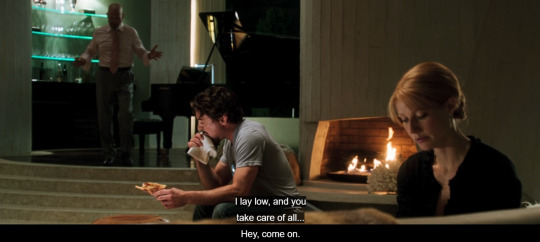
Conclusion: Tony was never really the CEO of SI. He was its R&D Department.
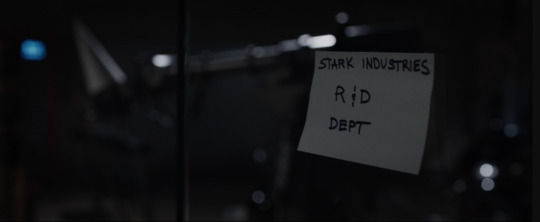
He was never a businessman, but had to pretend to be one. He was not a businessman not because he was incapable or lazy. He was smart enough to do the job. It just wasn't his thing. He was glad to get rid of this obligation as soon as possible. After 20 years of living a life he never wanted, it certainly felt great being someone closer to himself.

P.S. Happy non-CEO 1602 Tony says Hi from his science barn (he also knows the local Robin Hood, but shh...).
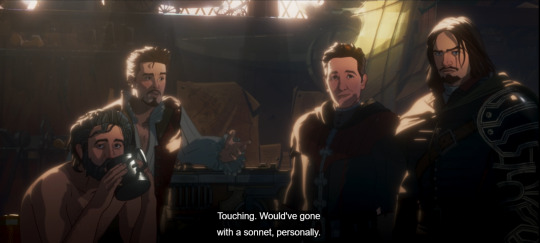
#marvel#mcu#tony stark#iron man#the avengers#iron man 3#iron man 2#pepper potts#obadiah stane#business#stark industries#what if
51 notes
·
View notes
Text


Last week, the Black Keys, a band best known for soundtracking car commercials and occasionally fistfighting fellow Nashville resident Jack White, canceled the entire North American leg of a scheduled arena tour without explanation. Why would a band without a major hit in years think it can sell out arenas in tertiary markets? No one can be sure, but the touring business is in trouble, and part of the reason is ego.
Going on tour used to be a non-negotiable part of a life in music—a way to interact with fans, make money, and see the world. But nowadays, artists either want to play arenas or stadiums or do a residency, playing multiple nights in one city at the same venue, à la Harry Styles and Adele. Every week, another artist goes viral on Twitter for low ticket sales, with a screengrab of a Ticketmaster seat map awash in blue.
[…]
So, who do we blame? Is this the fault of corporate mega-promoters like LiveNation (which produced the Black Keys’ tour) booking artists into the biggest venues possible, then jacking the price of everything from tickets to parking to concessions, all regardless of what the market will bear, while tightening their grip on the marketplace to the point that the Department of Justice is preparing to sue them in federal court for antitrust violations? Is it agents and managers gassing up the artist? Is it just the artist's desire to sell out these giant venues? Maybe all of the above.
If you’re going out on the road and you’re big enough to even consider booking an arena show, why not do three nights in a prestigious venue like Radio City Music Hall or the Beacon Theatre instead? It provides fans with a more intimate experience, and every night will feel full. The Black Keys eventually released a statement. They didn’t blame anyone. They didn’t whine about how hard touring is. They just said they were recalibrating after a successful European run playing venues like Brixton Academy in London and the Zenith in Paris. It was the right approach. We all know it was ticket sales, but no artist should be ashamed of taking your lumps, switching things up, and selling tickets.
Big streaming numbers look great online but don’t necessarily translate to ticket sales. A touring business has to be built, returning to the same cities every year. A career cannot rely solely on the algorithm. Being great live will get people through the door and keep them coming back. These offline collective experiences are few and far between these days; buying tickets and going to shows is essential and valuable. They just don’t all need to be in arenas.
Full article here
#Music industry#touring industry#canceled shows#I think fans would almost seats prefer intimate#arenas and stadiums are prestige#and a quicker way to make money#But it’s killing the touring business
37 notes
·
View notes
Text

Sorry, ma'am. This register only takes treats.
#jade esteban estrada#comedy#getjaded#comedian#entertainment#hilarious#funny#gay#business#service industry#work#jobs#jobs in usa#employment#memes#meme#funny memes#memedaddy#tumblr memes#dank memes#humor#haha#lol#dog memes#dog#dogs#dogs of tumblr#animals#doggos#puppies
30 notes
·
View notes